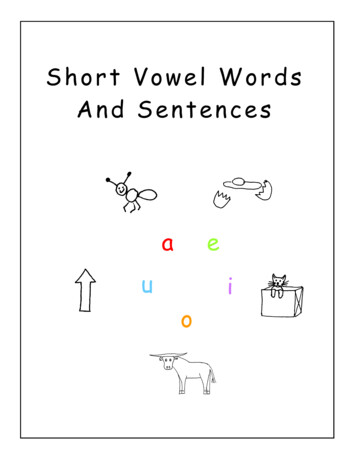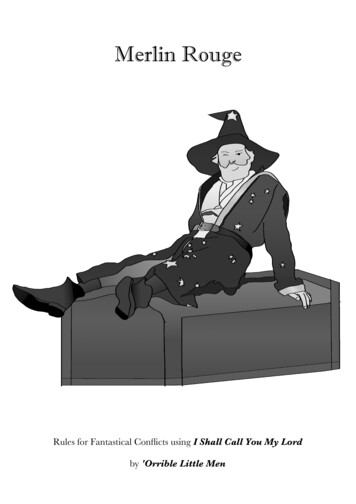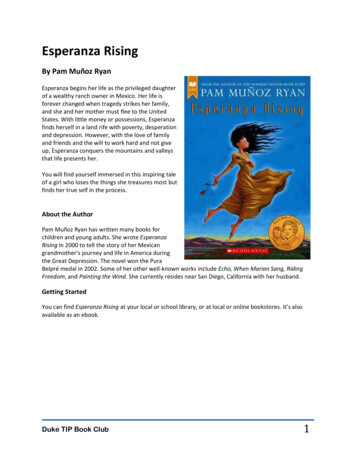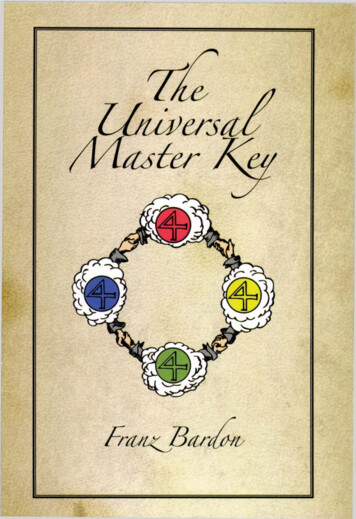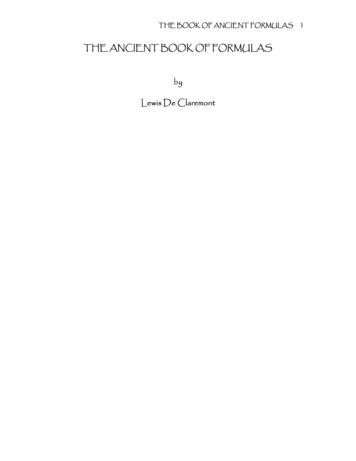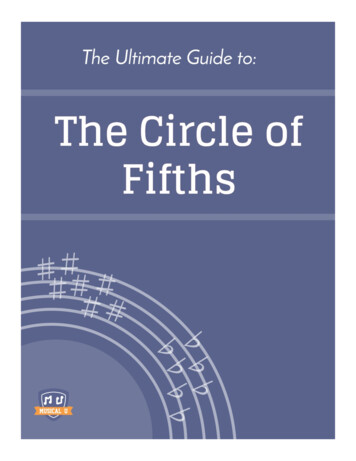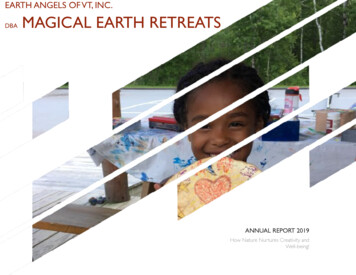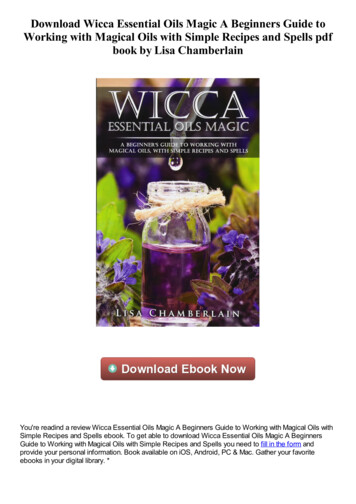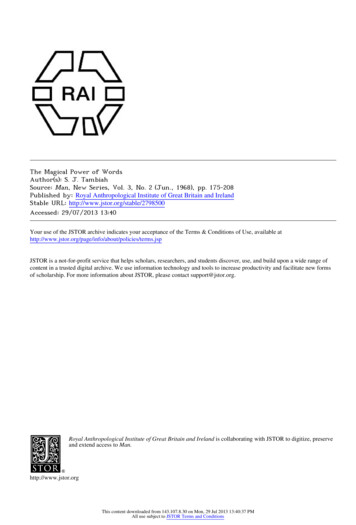
Transcription
The Magical Power of WordsAuthor(s): S. J. TambiahSource: Man, New Series, Vol. 3, No. 2 (Jun., 1968), pp. 175-208Published by: Royal Anthropological Institute of Great Britain and IrelandStable URL: http://www.jstor.org/stable/2798500 .Accessed: 29/07/2013 13:40Your use of the JSTOR archive indicates your acceptance of the Terms & Conditions of Use, available at ms.jsp.JSTOR is a not-for-profit service that helps scholars, researchers, and students discover, use, and build upon a wide range ofcontent in a trusted digital archive. We use information technology and tools to increase productivity and facilitate new formsof scholarship. For more information about JSTOR, please contact support@jstor.org.Royal Anthropological Institute of Great Britain and Ireland is collaborating with JSTOR to digitize, preserveand extend access to Man.http://www.jstor.orgThis content downloaded from 143.107.8.30 on Mon, 29 Jul 2013 13:40:37 PMAll use subject to JSTOR Terms and Conditions
THE MAGICALPOWEROF WORDS*S. J.TAMBIAHofCambridgeUniversityWordsin ritualhasin ContemporarythatMalinowski,perhapsadvance,anditis remarkableforitstheoreticallinguisticsnot onlysaw thisrelevancebut alsothanmanyof hissuccessors,morefar-sightedfromhistheoryof languagewhichsprangdirectlyputforwardan ethnographicalin ork,Malinowskiarguedthatthepotencyof Trobriandmagicwas feltby theTroin Volume2 ofto lie inwords(spells).In d theirmagic,he providedan unusualamount of supportingon linguists,notablyJ. R.linguisticdata. This evidencehas had some influenceCan anFirth,but it has never been criticallyexaminedby anthropologists.managedtogetmoreout of theevidencethanMalinowskihimselfanthropologistor by closerattenmaterialfromotherculturesdo,eitherby resortto comparativetionto Malinowski'sown material?successorswho workedin e verbal componentin ritualwas heroleofI963; R. FirthI967), theorthodoxanthropologicalofa sequenceofbehaviourconsistingwordsin ritualwhichwas seenas stereotypedhas menttiesis a complexofwordsandactions. itis notthecasethatwordsareone thingof thewordsitselfis a ritual.'and theriteanother.The utteringofthewordandthedeedis thatritualas consistingOne virtueat leastofdefiningthisformulasolvesthedilemmaposed by Goethe'sFaust-whetherin thebeginningtherewas thewordor thedeed.Freudconcludedhis Totemandtaboowiththethatin the beginningwas the deed. Accordingto Gellnerrhetoricalstatementtriedto solve the puzzle byphilosophyhas unsuccessfullylinguistic22),(I959:about Faustis thathesayingthat'the word is a deed'. What I findinterestingfromtheword,to thought,thento thenotionof power,and esefourtermsarein facttheingredientsrelationbetweenthewordand thedeed,withtheotherwhichthereis a reciprocalinThe formularaisesone questionthatis quantitativetwo termsintervening.nature:theratioofwordsto actionsmayvarybetweenritualsin thesamesociety* The MalinowskiMemorialLecture,deliveredat theLondonSchoolof EconomicsandPoliticalScienceon 2o FebruaryI968. Extra materialhas been added to the textof thelecture:futureMalinowskilectureswill,however,be publishedas delivered.This content downloaded from 143.107.8.30 on Mon, 29 Jul 2013 13:40:37 PMAll use subject to JSTOR Terms and Conditions
I76S. J. TAMBIAHwith(or evenbetweensocieties).At one extremeis thecase of ritualsperformedwords alone and at the otherthe case whereactionsdominatethoughperhapswordsare not excluded.Most ritualsfallin betweenbut yet may show distinctofwordsto acts.Thusa healingritualor an initiationin a collectiveritein whichthereis massparticipaand moreon the displayof contionmay relylesson s.as otherIn mostcasesit would appearthatritualwordsareat leastas importantpoint,veryoften(butkindsofritualact; butbesidesthat,and thisis an intriguing'Why is this ritualquestionshis informantsnot always) if the akestheformofa formallyeffective?'if utteredin a veryin the'words' even thoughthewordsonlybecomeeffectivespecialcontextof otheraction.In attemptingto solve thispuzzle thefirstpointI want to make is thatritualcategory.Ritualsexploita numberwordscannotbe treatedas an undifferentiatedof verbalformswhich we looselyreferto as prayers,songs,spells,addresses,to studywhethera ritualis composedof suchrecogetc.It is necessaryblessings,in termsof theirinternalfeaturesnisedcategoriesand to mand theirsequence.The factthatsucha batteryintotheartofritualbutalso dispelin a singleriteshouldnotonlygiveus insightstracesof a Frazerianhangover.Some of us have operatedwiththeany lingeringfrom'religion'; we have thoughtofconceptof 'magic' as somethingdifferentassociatedwithmagic;weand as beingintrinsicallyspell' as actingmechanicallykindofhaveopposed'spell' to 'prayer'whichwas thoughtto connotea differentcommunicationwith the divine.Frazercarriedthisthinkingto an extremebyopposed to religionand in the interestofthatmagic was thoroughlyassertinghalftheglobe as victimsof agicwithreligion'.It is possibleto questionthe generalvalidityof thisdichotomyby demonin Ceylonthereareuseda varietyofthatin a singleclassofritualspractisedstratingsequenceand thattheverylogic of theritualdependsverbalformsin a particularA Sinhalesehealingritualor exorcismceremonyon thisorderand chaccompanyotherritualacts(suchof objects).They are calledand manipulationas dancing,miming,food offeringskannalavvaand kaviya,and theyare arrangedin a progressionof fourmantra,to ourThe mantracorrespondssequencesbeginningand endingwiththemantra.4ithasa characnotionof 'spell'. It is in prose,ithasno poeticstructure,stereotypeis mutteredteristicopeningand ending(e.g. 'omnamo'and 'hring').The mantrasecretknowledge.by theexorcistand it is notmeantto be heardforit constituteswhichsummonthe demonsof mantraThe ceremonybeginswiththe recitationforthe disease.This summoningis phrasedin Sinhaleseas 'hittingresponsiblewithsound' (andagahanava),butthelanguageofcommandis also accompaniedbythe languageof entreatyand persuasion.These spellsalso containabbreviatedallusionsto mythsand chis chantedaloud in rhythmicThis sequenceis thekannalavvalanguageand is meantto be heardand understoodposed of ordinaryintelligibleThe ritualas a publicceremonymaybe saidto beginwiththeby theparticipants.This content downloaded from 143.107.8.30 on Mon, 29 Jul 2013 13:40:37 PMAll use subject to JSTOR Terms and Conditions
THEMAGICALPOWEROF WORDS177It stateswhy the ceremonyis beingheld,describesthenatureof thekannalavva.patient'saffliction,and makesa plea to thegods to come and blesstheceremonyand to the demonsto act benevolentlyand removethe ings.The nextin sequencearethekaviya(verses)whichtakeup themajorpartoftheceremony.Kaviya are composed in quatrainswith end (and sometimesalsobeginning)rhymes.Sinhalesekaviyaare highlylyricaland framedin literarySinhalese(of the sixteenthto eighteenthcenturies),perfectlybut guage.They are normallyrecordedintexts.Fromthepointof view of thedramaticpresentationof theritualit is importantthattheyare sungloudlyto theaccompanimentof musicand mime.Thesemanticcontentof theversesis a long and highlyredundantrecitalof theoriginin which the demonsfinallymythsof gods and demonsand theirencounters,subjectthemselvesto the practiceof conditionalevil, sanctionedby the deities(varam),providedthathumansreciprocateby appropriategiftgiving.In theriteinthe mythsare sung orderthatevil and diseasecan be edrealisticallyon thestageso thattheappropriatechangingtheundesirableto thedesirable,in nof thepatient,withhisunequivocalparticipation,can takeplace. The redundancy,lengthyrecitaland stagingare contrivedto achievethatcrucialunderstandingby thepatientof hisillnesswhichis a necessarypreludetoand a conditionof thecure.The ceremonylogicallyenoughconcludeswitha mantrawhichenactsthe desthus:'Justas god so andso, by a certainactionsubduedsuchand sucha demon,by thatpower may thepatientovercomethediseaseand thedemonbe subdued'.The lexicalandsemanticcontentsof thespellspresenta specialproblemwhen comparedto theothertwoforms(invocationand praisesongs)whicharereadilyintelligibleand heardby theaudience.Indologistswill be familiarwiththe literatureon the long -inHinduismandBuddhism.I shalllimitmyselfdigressfrommymainthemeifI enterthatterritoryandshallthereforeto theSinhalesesituation.A prevailingmisconceptionis thatSinhalesemantraare unintelligibleor evennonsensical.5Credibilityis lentto thisnotionby thefactthatmantraarereferredtoas the'languageof thedemons'(yaksabasava)as opposedto publishedSinhalesemantramadebyWimalDissanayakeof King's College, Cambridge,shows thattheyembodya subtledesignwhichusesthenotionof a hierarchyof languages.When Hindu gods areinvokedand texpressions,no doubtdistortedfromthepointof view of thepurist.When theBuddha andBuddhistmythologicaleventsarealludedto,Pali wordsareemployed,once againportrayingsyntacticalinfelicities.When howeverthe spell actuallynarratesanoriginmyth,thelanguageusedis thatof theclassicalSinhaleseliteraryformsprevalentin monsaredirectlyaddressedand commanded,thewordsare a polyglotmixtureand thereforeunintelligible,being compoundedof Sinhalese,Tamil, Pali, Sanskrit,Malayalam,Telugu, Bengali and even Persian.This exotic and powerfulmixtureis theThis content downloaded from 143.107.8.30 on Mon, 29 Jul 2013 13:40:37 PMAll use subject to JSTOR Terms and Conditions
178S. J. TAMBIAH'demonlanguage'.Somepointscanbe guagestratificationis indicativeof anguage'is consciouslyconstructedto connotepower,andthoughlargelyunintelligibleis neverthelessbasedon thetheoryoflanguagethatthedemonscan minatelyconcocted,thespellsshowa sophisticatedlogic.The roblemofwhethertheexorcistactuallyunderstandsall thewordscontainedin thespell.Fromhis,as wellas theaudience's,pointof view,thespellshavepowerby virtueof secrecyand theircapacityto ns.However,mantrado notfalloutsidetherequirementsoflanguageas a tyto humansis I haveindicatedinthisexampleis thata onthedemonstoinvocationandsupplicationofthegodsand demons,thento sungand dramatisedmythsin verseform,and concludeswitha typehasacharacteristicformand contentand thisstruc(thoughthisshowsredundancy),is fundamentalturedsequenceto sions.Ontheonehandtheydirectlycorrespondto includingwiththegodsand spirits;and on ccessfullyexperiencethepassagefromillnessto thepromisedcure.Furthermore,in thisexample,it is difficultto see wheremagicendsandreligionbegins.I am of sa crossculturalofdifferentrepresentativebutI am ereferto someexamples.communiverybrieflyThe Strathernsreport(personalbetweenprayer(atenga)and spellcation)thattheMountHagenersdistinguishas forexamplein differentbe combined(m0n);bothmayon occasionspatternsis madeto thewhena spellmaybe saidto removea sickness,andthena prayerisanaudibleinvocationancestralWhilea prayerghostsaccompaniedbya sacrifice.and a supplication,thespellsaremuttered,use thelanguageof commandanda seriesofmetaphorical& Strathernemployimages(seeStrathernI968 fordetails).RichardsstatescombineDr landspellswhicharedistinguishedas arepraisesongsandotherusesprayersof language.AgainVictorTurnerreports(I964) thatin theNdembuihambain hunters'cultsongswhicharesungtothereis massparticipationperformanceandtheairingof grievances,followed'pleaseihamba',by a spateof ctorandtheelders.Heprayersthatall theseelementsanddialogicalofconstitutea verbalformsand theirstructuredIt thusseemsto me tual.This content downloaded from 143.107.8.30 on Mon, 29 Jul 2013 13:40:37 PMAll use subject to JSTOR Terms and Conditions
THEMAGICALPOWEROF WORDS179SacredandprofanelanguageI wantnow to pursuefurtherof sacredwordsthequestionof theintelligibilityIfsacredwordsarethoughtto possessa specialto bothofficiantand congregation.kindof powernotnormallyassociatedwithordinarylanguage,to whatextentisthisdue to thefactthatthesacredlanguageas suchmaybe exclusiveand differentfromthesecularor profanelanguage?The role of languagein ritualimmediatelyconfrontsproblemsif placed inrelationto a primaryfunctionoflanguagewhichisthatitisa vehicleofcommunicationbetweenpersons.By definition,thepersonsin communicationmustunderstandone another.In ritual,languageappearsto be usedin waysthatviolatethecommunicationFor instance,it is possibleto anguagein theritualsof a villagein northeastI. Firstly,thereare ritualsconductedby Buddhistmonksin whichthesacredwordsarechantedaloud,i.e. theyaremeantto be gregationby sacredlanguageis thedeadPali language.In thiscasethewordsare broadcastbutnot understood.2. There is a secondset of ritualswhereagain the major featureis the loudrecitationof texts,but here the words are understoodbecause the local Laolanguageis used. The ritualsin questionare calledsikhwanor callingthe spiritessence.They are used by villageelderswhen installingmembersof thejuniorin villagestatuses,generationor as inauguralor thresholdritesbeforeindividualsIn thisinstance,then,wordsare broadcastand understood.startnew enterprises.3. In a thirdsetof ritesrelatingto theexorcismof rogationof thepatientis in thelocal versubstanceslikewaterwhichareusedto cleanseand purifythepatient.Here thevirtueof thespellsresidesin thefactthatit is secretknowledgesimilarto theSinhalesemantra.The languageis privateandis notmeantto be heard.The spellswhicharecalledgatha(verses)aresaidto beportionsof Buddhistsutra(sacredtexts)whicharein thiscontextusedin a specialmanner,and thereis someevidenceforsayingthattheexorcistis an inversionoftheBuddhistmonk.forme to give detaileddescriptionsIt is not necessaryof thesecondand thirdformswellknownto you. The spiritessencetypesof alswhichareconstructedritesharesthecharacteron thetherapeuticto and understoodtheorythatmessagesare to be transmittedby theorpatient.The ),celebrantpainttheritualsituationas a grandmythologicaleventin egodsthemselves,binda personto hisnew cecommitments,(especiallyandanticipateon parents),futureevents.By contrast,theexorcismritualusesshocktherapyin whichthepatientis made to confront,formulateand give objectiveformto hisillnessin termsofa demonicagentwhichis culturallydefined.Herethemustappearmoreterribleand powerfulthanthe demonexorcistas protagonistinsidethepatient,and agethedemonscan understand,butmoreimportantly,contributeto theimageof theexorcist'sown power.This content downloaded from 143.107.8.30 on Mon, 29 Jul 2013 13:40:37 PMAll use subject to JSTOR Terms and Conditions
I80S. J. TAMBIAHthatI wantto takeup becauseit representsIt is thefirstset,theBuddhistrituals,Thaisituation.The majorityof villagemonksin northeasta generalbutbafflingland(as in manyotherpartsofthecountry)areyoungmen who onlytemporarilyroleis to conductcalendricaloccupythestatusofmonk,and theirmostimportantritesand pleritualsand icuousparadoxesin thecommunicationdhistritual.The view is emphaticthatthePali chantsshouldbe recitedaloud andgainsmerit,blessingsand prothatthroughlisteningto themthe congregationThe chantsare oftection.Yet thesacredPali wordsas suchare not understood.6coursenot nonsensical-theyexpoundmattersof Buddhistdoctrine,the nobleand conquestoflife,victoriousepisodesin theBuddha'slife,of detachmenttruthswhichhaveno directrelationto theeverydayconcernsof villagelife.Yet at theconclusionof the chants,especiallythosedesignatedas paritta(chantsof blessingtheblessingstransferredby themonkto thelaymanarelonglife,and protection),paradoxis thattheconquestsofgood healthand faircomplexion.The intriguingtheBuddha whichrelateto thewithdrawalfromlifeare in theprocessof transof thesacredof life.Betweentherecitationto an affirmationferencetransmuteda mechanismofand the final'pay off' to the laymaninterveneswords (suitra)Forwhichis not farremovedfromthatimpliedin theSinhalesemantra.transferthe victoryblessingso oftenheardin Buddhistinstance,the chayamangalagdtha,rites,statesin eachof thestanzasa victorywon by theBuddhaand concludes'Bythispower,mayyou be endowedwithconquestsand blessings'.The mechanismof thewordsand theritualof transferdependsnot onlyon thesemanticstructureof gracethrougha sacredcordor byactsthataccompanythem(e.g. er)butalso on a ity.layman,whichconnotesan inter-generationalto elderlyhouseholderslong liferenouncetheirvirilityand sexualityand transfermaintainthemin theand ethicalmerit;thelatterin turnsponsortheirordination,whentheygiveup theirrobes,installthemas theirsuccestempleand afterwards,sors(TambiahI968).ofa moreThe factthattheBuddhistchantsarecouchedin Pali is representativewhichalso showthesamegeneralfeatureof tionbetweenreligiousand profanelanguage: Latin in theoccidentalCatholicChurch,Hebrew forJews,Vedic Sanskritfor Hindus andfromthelanguageofArabicforMuslims,are sacredlanguagesthatare differentattachedto thesacredlanguageandordinaryuse. But thenatureof theauthorityshows complexvariations.The Muslimstake up theits rangeof exclusivenessonlyin itsoriginalArabicand thatitextremepositionthattheKoranis efficaciousThe Jewishattitudeto theBiblicalwill ceaseto be theBook by beingtranslated.textsis thesame-the wordofGod is in Hebrew.On theotherhandtheCatholicswrittenin Latin,thatanypartof theBible was originallyhave nevermaintainedby thePopeversion,theVulgate,was authorisedbut it is thecasethattheofficialas Vicarof God in I546 at theCouncilof Trent.This textwentthroughcertainversion.centuryto reacha definitiverevisionsin thesecond'halfof thesixteenthLatinhad by 250 A.D. supplantedGreekand becometheBut moreinterestingly,language of church governmentand worshipin Rome and for the entireThis content downloaded from 143.107.8.30 on Mon, 29 Jul 2013 13:40:37 PMAll use subject to JSTOR Terms and Conditions
THEMAGICALPOWEROF WORDSconsideredtheholylanguageof theoccidentalwesternworld,andwas explicitlychurch.heldthatIn Islam,Hinduism,BuddhismandJudaismtheview hasbeenstrictlyin religiousceremoniesthesacredwordsrecitedshouldbe in thelanguageof theunderstoodtheauthorisedsacredtexts.The problemwhethertheircongregationseitherthe efficacyof thewordsor not was not a major considerationaffectingThe Catholicritualor the changein the moral conditionof the worshippers.Churchmaintainedthesameview in respectof Latinliturgyuntillastyear.It attempted destroyandritualismoftheestablishedandamongtheto increaseaccessibility understandingsacredlanguageinan alvinists,faithful;Lutherans,also attackedthe Latin Bible on the groundsthattherewere older and morelessonto be learnedhere.EvangenuineGreekversions.Thereis an importantEnglishmenoftenget passionatelycommittedto the precisegelical Protestantversionwordingof theBiblicaltext,as it appearsin theEnglishof theauthorisedillogicallyperhaps,by the King. Theof i6ii, even thoughit was authorised,to theSanskritof theBrahmansto preachBuddhauseda local dialectin contrasthismessage,butPali itselfwas laterto becometheenshrinedlanguageofTheravadain turncome to have theirtrueversionsandBuddhism.And breakawaychurchesfirsteditionsof doctrinearoundwhichproblemsof orthodoxycentreand whichand of textualcriticismandscholars.Thusin all thesecasesitcould bethebreadand butterfortheologiansbecausetheyare ancient,but thatit issaid thattextstendto ritythe problemof theThe questionthenis: how importantis it in unravellingfromthe ordinarypower of sacredwordsthatthe sacredlanguagebe differentin thefactthattheKoranis in Arabicand thelanguage?Is therea vitaldifferenceis not absoluteTrobriandsacredwordsare in Trobriand?I thinkthe distinctionbut only relative.It is truethatin many of thesehigherreligionsthe sacredlanguageis thoughtto be thatlanguagein whichthe saviour,or prophetorsaintfirstrevealedthemessage(or in the case of Catholicismto be thelanguagein termsofrevelationor authorityisauthorisedby thePapacy).But thisargumentwho believedthattheirspellscamewiththeirjustas applicableto s,and thereforeprovidesno distinguishingbetweenrevealedand naturalreligionand primitivereligion.Tylor'sdistinctionis false.A moreconvincingreasonmaybe thatthesacredwordsofIslam,Buddhism,andtheJewishand Christianfaithsat somepointcame to be writtendown,and thattechnologythatfixesand freezesreligiousdogma in awritingis a revolutionaryfromthe dogma of oral traditionwhich is inevitablymannerthatis differentflexibleand adaptive,even thoughit believesin an unchangingtradition.Butor a relativedifference?For the problemthatI amagain is thisa f sacredwords-this distinctionis by itselfinsufficient.The sharpdisjunctionbetweenthecase of a writtenholylanguageand a secularlanguagein higherreligionis paralleledin theTrobriandsof thesamekind,betweentheelementsofneverthelessby a weakerdisjunction,This content downloaded from 143.107.8.30 on Mon, 29 Jul 2013 13:40:37 PMAll use subject to JSTOR Terms and Conditions
I 82S. J. TAMBIAHspellsand thelanguageofarchaicor esotericlanguagein theorallytransmittedinordinaryuse. Many 'primitive'peopleswho recitetheirreligiousmythologysaga formdo so in an 'archaic'formof speechwhichis onlybarelycomprehene.g. thisis thecaseamongtheKachin.The pointisspeakers,sibleto contemporarysocietiesharksback to athatas long as religionbothin literateor pre-literatetruetextsofproperlytransmittedand insistson theauthorityperiodofrevelationeitherorallyor in writtenform,itssacredlanguagewill containan archaiccomlanguageor olderelementsby a totallydifferentponent,whetherthisis representedof thesamelanguage.oralor writtenIt is perhapsrelevantto note,wheneverwe s,thattheir'archaicness'mayalsobe symbolicusesin a reI965).gaps(Vansinameaningwordsmadepossibleby thealphabet,by givinga physicalexistenceto words,maylendto writtentexts.Thus it is not at all accidentalthatthepresentadded venerationfortermthemajoralphabetin Indiais Devanagari(theabode of theGods).dayAnother criterion-thatof the degree of specialisationand trainingandof religiouspersonnel-isagain of littlevalue in thebeliefin thepower of sacredwords.It is frequentlythatliteracyitselfis specialisedandwhichthehigherreligionsexistare son sthoodis separatedfromlay occupationsand modes of life.skills,subjectionto taboos,and exclusiveknowledgeof sacredloreBut specialisedof thereligiousexpertsof simplernon-literateare in varyingdegreecharacteristicsocietiesas well.notstrictlyunderFinallythefactthatthePali chantsofBuddhismarenormallystood by thelaitybut thatthelanguageof Trobriandspellsis largelyintelligiblein tto theTrobrianderswardssacredwords.Thisis so becausefortheBuddhistlaymanthefactthathe doesdoes not mean forhim thatthe chantsare mumbo-jumbo.Henot understandbelievesquite rightlythatfor thosewho know Pali the words containgreatandinvolvementofhisunworthinessisa paredwiththatofthemonk.I havethuscometo thein an inferiorbetweensacredand blelinkedto the need tolanguagewhichexistsas a generalfactis not necessarilyembodysacredwordsin an exclusivelanguage7or in writingand,secondly,thatin respectofboth higherand lower religionsportrayno qualitativedifferencesandofreligiousoffice,and trueknowledge,specialisationtheirbeliefsin revelationto sacredlanguageswhetherthoselanguagesare understoodor not.attitudesa generalstatementabouttheto tryto formulateIt sacredwords.No book on religionorthewidespreadoriginsof languagefailsto referto thisancientbeliefin thecreativepowerof theTheword. It would be possibleto confirmthisbeliefin the classicalliterature.Vedic hymnsspeculatedon vac (theword) and assertedthatthe gods onstatesthatinthebattlebetweenintogood and evil it was throughthespokenword thatchaoswas transformedcosmos; ancientEgypt believedin a God of the Word; the Semitesand theThis content downloaded from 143.107.8.30 on Mon, 29 Jul 2013 13:40:37 PMAll use subject to JSTOR Terms and Conditions
THEMAGICALPOWEROF WORDSI 83Sumerianshave held thattheworld and itsobjectswere createdby theword ofGod; and theGreekdoctrineof logospostulatedthatthesoul or essenceof thingsin thesomehaveentangledthemselvesresidedin theirnames.But ssertedthatthewordinitsown rightorofthesupernaturalwas powerful,or whetherit ord'sanointed.What has not beenseenis iplevaluesaregivento thecharacterforma setofthreepostulatessacredlanguage,and thatthesevaluestakentogetherin mutualtension.thistrinityofideas:serveto illustrateThe Bible can convenientlyThe firstidea is thatGod createdtheworldby assigningnames.'And GodcalledthelightDay, and the darknesshe calledNight' (GenesisI.5). (Togetherbywiththisgoes theidea in certainreligionsthattheCreatorGod createdhimselfhisown name.)uttering2. The Bible also assertsthe directlyoppositeidea thatafterGod had createdthroughspeech.'And out ofassumedthenamingfunctionheavenand earth,manLordGodofthefield,and everyfowlof thethegroundtheformedeverybeastair; and broughtthemuntothemanto seewhathe would callthem:and whatsoeverthemancalledeverylivingcreature,thatwas thenamethereof. .' (Genesisi.2. I9-20).whichisassignedto theword: thatitis an entity3. Thereisyeta thirdcharacterin its own right.Thus we readin Isaiah(55.II):able to act and produceeffects'. . . So shallmy word be thatgoethforthout of my mouth:it shallnot returnuntome void,butitshallaccomplishthatwhichI please,anditshallprosperin thethingwheretoI sentit.'in theTheseBiblicalnotionsexpressHebrewconceptsandI thinkcometogetherfirstlinesof the Gospelaccordingto St Johnwhichalso explicitlyrefersto theGreeknotionof logos:theword was in thebeginningwithGod, theword wasmadefleshinJesusChrist,and thosewho receivedChristbecamethesonsof Godand theword dweltwiththem.It is thesethreenotionsthatare also reflectedin ha,theall-enlightenedone,was thesourceof thesacredwords;theDhamma,thedoctrinespreachedby theBuddha,and inscribedin thetextsarethemselvesvirtueholyobjectsin theirown right,and can transmitand dispelevil; and the Sangha,the monasticorderwhose ordainedmembersagentfora recitalof the sacredpractisegood conduct,is the din ositions:i. Magic appearedwiththefirstancestorswiththeand eycreated.'Magic is a thingneverinventedandnev
fieldwork, particularly from his immersion in Trobriand magic.' Malinowski argued that the potency of Trobriand magic was felt by the Tro- brianders to lie in words (spells). In many of his works, particularly in Volume 2 of Coral gardens and their magic, he


